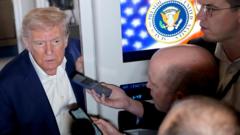In a surprising move, the Trump administration has exempted smartphones, computers, and other electronic devices from the recently enacted "reciprocal" tariffs, including the 125% tariffs on imports from China. This announcement was confirmed by US Customs and Border Patrol, which revealed that these items would be excluded from Trump's broader global 10% tariff that impacts numerous countries, as well as the more substantial levies specifically targeting Chinese products. Trade analysts have hailed this as a potential "game-changer" for the ongoing trade conflict with China.
During a flight to Miami on Saturday, Trump indicated that more detailed information regarding these exemptions would be disclosed early next week, asserting to reporters, "We're taking in a lot of money as a country." The decision follows mounting concerns from American technology firms regarding possible price hikes for devices predominantly manufactured in China. The exemptions, which are effective retroactively from April 5, also encompass other critical electronic components, such as semiconductors and solar cells.
Dan Ives, head of technology research at Wedbush Securities, expressed optimism over the news, stating that this development is a "dream scenario for tech investors." With major companies like Apple, Nvidia, and Microsoft benefiting from this decision, there is a collective sense of relief among the tech giants. The White House's decision to unburden these firms from tariffs is reportedly aimed at providing them additional time to relocate production back to US soil.
White House Press Secretary Karoline Leavitt emphasized President Trump's belief that America should not rely on China for essential technologies, such as chips and smartphones. She announced that at Trump's direction, these tech companies are urgently working to transfer their manufacturing operations to the US.
While Trump has remained comfortable with substantial tariffs on China, he noted that such measures are expected to yield positive outcomes. He also acknowledged that the tariffs on Chinese goods remain heightened, citing China's willingness to retaliate with significant levies against US products.
Current estimates indicated that without these exemptions, the price of phones like the iPhone could have skyrocketed, potentially tripling costs for consumers. Apple, which enjoys a dominant position in the US smartphone market, produces the majority of its iPhones in China, prompting the company to seek diversifying its manufacturing away from reliance on Chinese production to locations like India and Vietnam.
Alongside these changes, Trump had also planned to impose a variety of steep tariffs on various countries; however, last week he announced a 90-day pause on these plans, intending to negotiate more favorable trade agreements. His tariffs are part of a broader strategy aimed at correcting perceived inequities in international trade, fostering domestic job growth, and revitalizing US manufacturing.



















